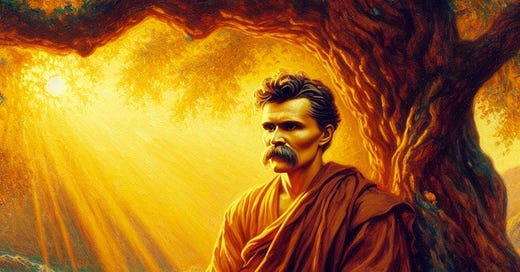An interview with the late writer E.M. Cioran reveals the quintessential Gammatude of the faux-philosopher and fantasist Friedrich Nietzsche.
LA TIMES: Were you reading Nietzsche then?
CIORAN: When I was studying philosophy I wasn’t reading Nietzsche. I read “serious” philosophers. It’s when I finished studying it, at the point when I stopped believing in philosophy, that I began to read Nietzsche. Well, I realized that he wasn’t a philosopher, he was more: a temperament. So, I read him but never systematically. Now and then I’d read things by him, but really I don’t read him anymore. What I consider his most authentic work is his letters, because in them he’s truthful, while in his other work he’s prisoner to his vision. In his letters one sees that he’s just a poor guy, that he’s ill, exactly the opposite of everything he claimed.
LA TIMES: You write in The Trouble with Being Born that you stopped reading him because you found him “too naïve.”
CIORAN: That’s a bit excessive, yes. It’s because that whole vision, of the will to power and all that, he imposed that grandiose vision on himself because he was a pitiful invalid. Its whole basis was false, nonexistent. His work is an unspeakable megalomania. When one reads the letters he wrote at the same time, one sees that he’s pathetic, it’s very touching, like a character out of Chekhov. I was attached to him in my youth, but not after. He’s a great writer, though, a great stylist.
The crazy thing about Nietzsche is that a lot of people actually took him seriously, when in truth he was never anything more than a talented scribbler of navel-gazing fantasy fiction about himself. His entire ouevre is one gargantuan delusion bubble, or, as Cioran correctly describes it, “an unspeakable megalomania”.
Every writer writes about what he knows, but the only thing Nietzsche knew was his narcissistic fantasies and his burning hatred for the Christian civilization that forced him to be aware that he was a pathetic nonentity of little accomplishment who was repulsive to women. Little wonder that he died an insane syphilitic; he would have been the original involuntary celibate had he not been able to afford the occasional prostitute.
Friedrich Nietzsche was not a superman, he was merely a supergamma. He was a forerunner of the New Atheists. If he lived today he would have been this guy.

In a future post, I’ll quote the passage from one of Robert Anton Wilson’s novels in which he absolutely skewers what little remains of the intellectual corpse of the great Gamma philosopher. It’s downright hilarious.





Glad you enjoyed my reference to Cioran in the prior post... Nietzsche suffered from an "unspeakable megalomania", but there's a reason he's still discussed and quoted so much to this day; and that reason, imo, isn't so much the will to power or the ubermench or what have you, or even his interesting style, but rather his correct identification with the transvaluation of values brought forth by Christianity to upend the Roman world. The dichotomy between the pathetic state of his personal life and his conception of the ubermench, while funny, is utterly dwarfed by this identification, imo. His "On the Genealogy of Morality" was mind-blowing and answered the question about why everyone is so obsessed with equality/egalitarianism in all its forms...
As mainstream historian Tom Holland explains:
"If you look at the cross, it’s such an odd thing to have as a focus of veneration, and to have as a fundamental symbol of civilization. Because a cross is a symbol of torture. And to the Romans it was an emblem of their power to torture to death their inferiors. So crucifixion was inflicted on those who opposed Roman power in the provinces. But it’s also the paradigmatic fate that is visited on slaves who rebel against their masters. And everyone who’s seen Spartacus remembers the rows of crosses lining the Appian way. It’s a billboard advertising the ability of Rome to crush rebellion by the weak, and therefore it serves as a symbol of the powerful over the powerless. Christianity absolutely upends that it says the cross is a symbol of the powerless triumphing over the powerful, the slave triumphing over its master, of the victim triumphing over the torturer, and this is such a radical notion its hard to express how radical it is. And the idea that the last shall be first, that there is inherent dignity and value and power in being a victim, this is something that would have been utterly bewildering to the Romans. And it takes a long time for first the Roman world and then the world of the Germanic conquerers in the west and so on to properly synthesize and understand it. And thats why I think in a way we are so habituated to it that it takes an effort to understand just how weird and strange that idea is.
And its why actually I think the modern who has most profoundly and unsettlingly understood just how radical that idea is, how radical the idea that the cross of all things should become the emblem of a new civilization was a man who was not just an atheist but a radically hostile anti-Christian atheist Frederick Nietzsche, and Nietzsche said this is a repellant thing. Nietzsche identified the power and the glory and the beauty of classical civilization and he thought that Christianity was notoriously a religion for slaves and he saw in the emblem of Christ nailed to the cross a kind of disgusting subversion of the ideals of the classical world, privileging of those who properly should be ground beneath the heels of the mighty, and he saw it as a kind of sickness that then infected the “blonde beast”, that this primordial figure of the warrior gets corrupted and gets turned into a monkish figure who’s sick with poverty and sympathy for the poor and the oppressed, and Nietzsche thought it was disgusting. Now those ideas, however vulgarized, of course feed into a very septic subject which is fascism.
Fascism, I think, was the most radical revolutionary movement that Europe has seen since the age of Constantine. Because unlike the French Revolution, unlike the Russian Revolution, it doesn’t even target institutional Christianity: it targets the moral/ethical fundamentals of Christianity. The French Revolution, the Russian Revolution are still preaching the idea that the victim should be raised up from the dust and that the oppressor should be humbled into the dust; it’s still preaching the idea that the first should be last and the last should be first just as Christ has done.
The Nazis do not buy into that. The Nazis buy into the Nietzschean idea that the weak are weak and should be treated as weak, as contemptible, as something to be crushed….
Atheists of today [like Richard Dawkins et al]… they are basically Christians. Nietzsche saw humanists, communists, liberals—people who may define themselves against Christianity—as being absolutely in the fundamentals Christian, and I think he is right about that because I think that in a sense atheism doesn’t repudiate the kind of ethics and the morals and the values of Christianity."
From: youtu.be/c0gsPo2ilj8
Exactly. And Nietzsche has almost nothing to say about marriage and family. That's a gamma giveaway sign too.